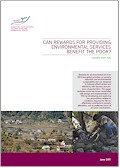| Brief |
 |
|
| Title | Can rewards for providing environmental services benefit the poor? Lessons from Asia | | Author | Beria Leimona, Laxman Joshi and Meine van Noordwijk | | Year | 2011 | | Publisher | World Agroforestry Centre - ICRAF, SEA Regional Office | | City of Publication | Bogor, Indonesia | | Number of Pages | 8 | | Call Number | PB0026-11 |
|
| Abstract: |
| Rewards for environmental services (RES) link global priorities on poverty reduction and environmental sustainability and are designed to balance effectiveness and
efficiency with fairness and propoor characteristics. This paper assesses some key issues associated with design and implementation of RES by developing and exploring
two propositions related to conditions required for RES to effectively contribute to poverty alleviation, and to preferred forms of pro- poor mechanisms.
The concept of rewarding local people who protect the environment and the services
provides links to two global priorities: to reduce poverty and to sustain the environment.
Pilot schemes based on the concept should ideally aim to balance effectiveness and
efficiency with fairness and supporting poor people.
However, most tend to focus primarily on the efficiency of providing the environmental
services and often neglect the local people involved in managing the natural resources,
their livelihood strategies and the multi-dimensional nature of poverty. |
|
|
Download file(s): Click icon to download/open file.
|
| |
File Size |
Description |

|
544 KB |
Softcopy |
|
|
GRP 6: Developing policies and incentives for multifunctional landscapes with trees that provide environmental services
|
| Viewed in 2379 times. Downloaded in 486 times. |